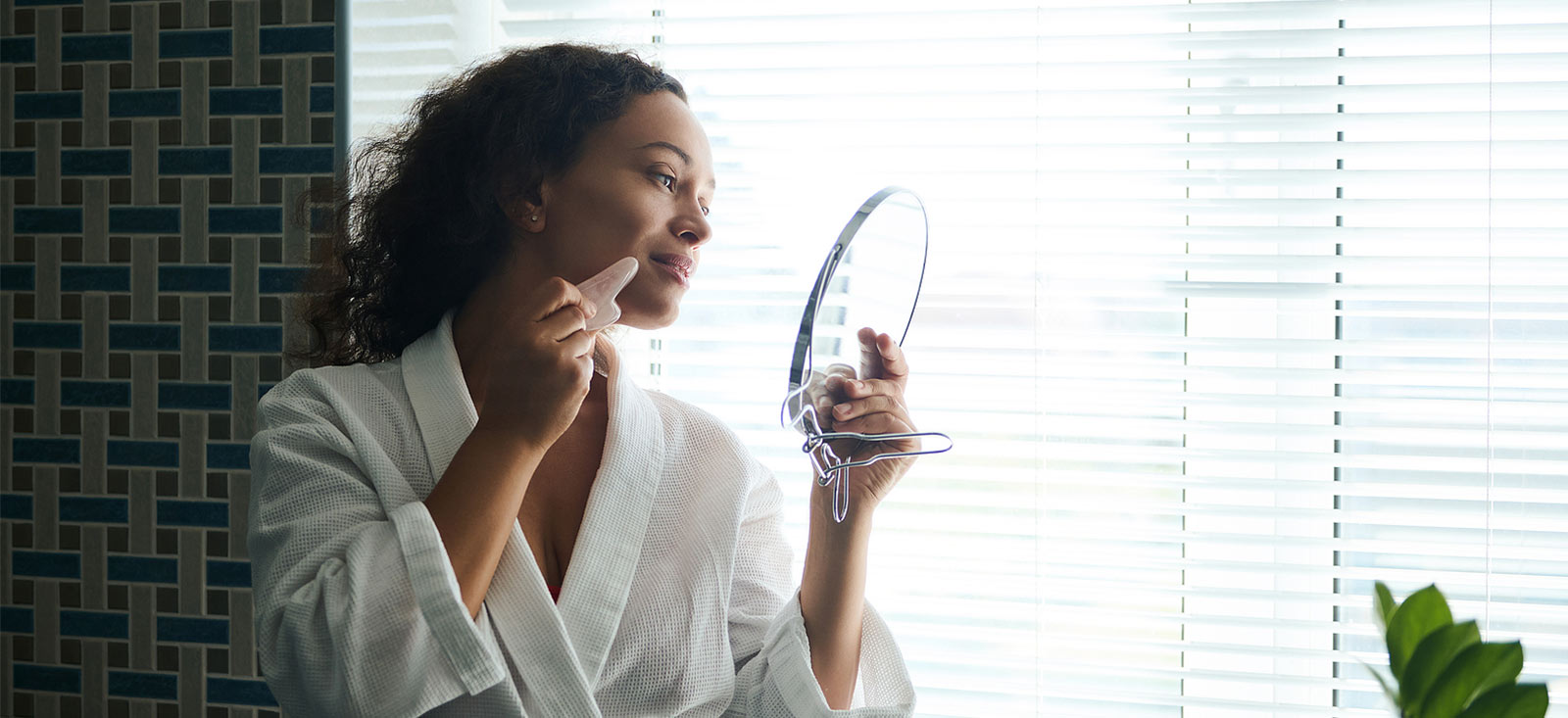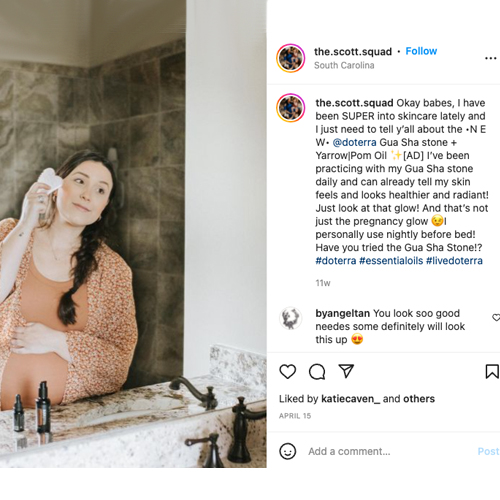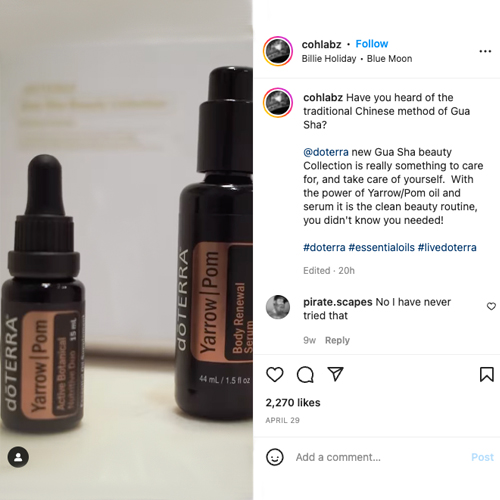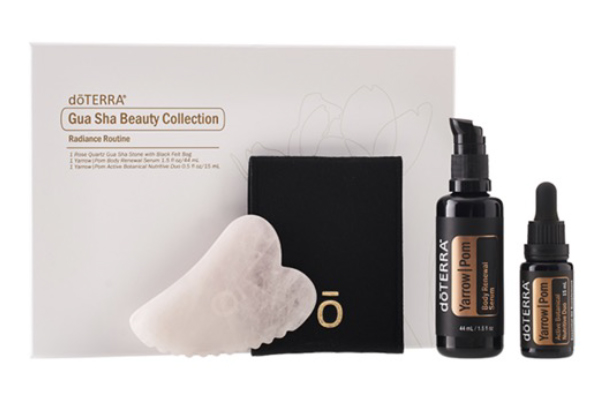Origin: a Latin derivative
meaning "Gift of the Earth."
- Shop
-
Our Story
- View Our Story Home
- Who We Are. . . .
- What We Do. . . .
- Why We Do It. . . .
-
dōTERRA[doh-teh-ruh]
Gua Sha 101: What It Is, How To Do It, and Gua Sha Benefits


Are you ready to learn everything you need to know about gua sha? If you’ve bought a tool but don’t know what to do with it, are on the fence about whether or not it will work for you, or just have no idea where to start—you’ve come to the right place. Read on to learn about gua sha benefits, techniques, and the very best in gua sha products available on the market!
If you’ve been anywhere near social media recently, it’s likely you’ve seen people equipped with smooth pieces of rose quartz, jade, or something similar, rubbing them over their faces, necks, and shoulders. Naturally, you might be curious what they’re doing and why.
For starters, this not-so-new trend is called gua sha, and it’s actually a part of traditional Chinese technique that’s been around for over 700 years. Gua sha is a massage technique used all over the body, but facial gua sha has become particularly popular in recent years in the Western world. Gua sha involves a scraping motion, which is where the name actually comes from—it means to scrape or scraping.
Let’s take a deeper look into the benefits of gua sha, the right oils and other tools for the job, and how to do it yourself so you can look and feel your best.
What Gua Sha Good For?
As mentioned above, traditional gua sha has been practiced for centuries across the world. In a professional setting, it is often coupled with bodily acupuncture to relieve muscle tension and increase blood flow to stressed regions of the body. The same is true for home practitioners as they report reduced puffiness and increased skin clarity when focusing gua sha practices on the face, neck, and shoulders. Gua sha massage can also be a relaxing part of your daily routine.
With all the positive gua sha benefits, it’s natural to wonder whether any negative side effects accompany this trending muscle scraping practice. For the most part, as long as it is performed properly, carefully, and gently, gua sha is thought to be a safe and effective tool-assisted massage technique. Minor risks include light bruising or capillary bursting if using too much pressure with your gua sha tool, which should be avoided, especially in the face and neck areas. Overall, incorporating gua sha into your beauty routine should result in a happier, more relaxed you—quite possibly with better-looking skin, to boot.

Photo Credit: doTERRA Partner, Jordan Scott @the.scott.squad
Does Gua Sha Actually Work?
To better understand the benefits of gua sha, we should look into how it actually works and the methods behind using this special tool.
When using gua sha on the body, you want to target muscle knots by first working perpendicular to the muscle fibers in order to break up the tension. When the muscle is sufficiently loose, you want to switch to a fiber-parallel direction to lengthen the muscle fibers and increase blood flow to the area.
When a gua sha tool is used properly on the body, it really does work! Of course, not everyone will see the same results or results to the same degree, but most will enjoy muscle relaxation.
Using gua sha for the face is a much gentler practice, with movement starting from the center of the face, moving outward and upward (more on this later). Many users of a good gua sha tool
who know how to use it properly have reported supporting lymphatic drainage, a softening of fine lines and wrinkles, less puffiness and dark circles, and a generally brighter, more even complexion with toned and tightened facial skin.
Using The Gua Sha For A Facial
Most people who own or are considering purchasing a gua sha tool often buy it for the facial benefits, so it’s important to get to know your tool and how to use it properly before beginning. The delicate skin on your face and neck will thank you!
First, gently clean and dry your face, hands, and gua sha tool. This is an important step—don't skip it!
Next, apply a facial oil or serum to help your gua sha tool glide smoothly and easily on your skin. And as a bonus, the tool will help your favorite gua sha massage oil absorb extra well.
Begin your gua sha facial massage by visually splitting your face in two, vertically, using your nose as the center point. You can use a combination of long and short strokes with varying pressures depending on the area you’re massaging and your personal preference. Remember, this should be a gentle and relaxing experience. The results will come even without aggressive scraping of your facial tissue. In general, keep your strokes in one direction rather than rubbing back and forth. Your motions should always be outward, away from the nose, and most choose an upward stroke toward the hairline. You also want to make sure your gua sha tool is held nearly flat against your face. During a body gua sha massage, it is common hold it closer to perpendicular at a 45 degree angle, but when performing gua sha on the face, keep your gua sha tool as close to parallel against your skin as possible.
You’ll notice that many gua sha tools have the general shape of a heart, with each part of the stone designed to work on different areas of the face, neck, and shoulders. Different parts of the stone naturally complement the area of the body you’re working on, but when in doubt, simply choose what feels comfortable to you.
Once you’ve started your gua sha facial massage, you’ll focus on each part of your face by performing three to five strokes in that that area before moving on. Remember to be gentle, especially around delicate areas such as the eyes.
For best results, perform your gua sha facial massage daily or at least three to four times a week. But no matter how often you do it, you’re likely to see and feel results more quickly than you might expect. Done properly, you will notice results immediately! However, you must perform it consistently for continued results.
If you’re still unsure, there is an easy-to-follow video here and here that will help give you the boost of confidence you need to start using your gua sha tool to start seeing results soon.

Photo Credit: doTERRA Partner, Nicole Marshall @nicole.marshall
Where Can I Use The Gua Sha Besides My Face?
Gua sha benefits extend beyond the face, as we mentioned before. The entire body can benefit from gua sha massage, but here are a few of our favorite places to use the gua sha technique and what it could do for you.
- Scalp. Gentle gua sha scalp massage can increase blood flow.
- Neck and shoulders. Move downward here to say hello to relief, improved posture, and relaxation!
- Hands. Going up and down and between fingers can help with discomfort and stiffness after working in the garden or on the computer for hours.
- Feet and ankles. Find relief by scraping with a gua sha tool.
- Lower back. Discomfort here can be brutal but can be helped with consistent gua sha massage and scraping.
- Legs. This can help encourage circulation. (Move upwards here!)
Our Favorite Oils For Gua Sha
The best oils and serums for gua sha are those that are full of nutrients your skin needs to look and feel its very best. Our favorite combination is found in our proprietary doTERRA Yarrow | Pom serum and oil. The oil is perfectly balanced and gentle enough for the face, while full of punicic acid to protect the skin and promote collagen production. The serum is created specifically for the body and contains powerful bioactive compounds to promote smooth, firm, and luminous-looking skin. Both the serum and oil are great additions to a clean beauty routine with results you can see and feel because of their clean, natural, carefully chosen ingredients. We love them both for gua sha specifically because they take time to slowly soak into your skin, allowing your gua sha tool to easily glide over your body and helping the nutrients to absorb throughout your massage.
When used in combination with our rose quartz gua sha tool, these clean body care products will help you feel good about your skin care, reduce the appearance of blemishes, and achieve the full body glow you deserve.

Photo Credit: doTERRA Partner, Aileen Bayliss @bayliss.storybook
The Only Gua Sha Beauty Collection You Need Right Now
Gua sha on its own may deliver decent results. But settling for mediocre isn’t what any of us is looking for. Using the best products and proper techniques will lead to undeniable and striking results you wouldn’t trade for anything. Armed with our Gua Sha Beauty Collection, you’re sure to see the results you’re looking for!
-
Copied to clipboard
- Download




